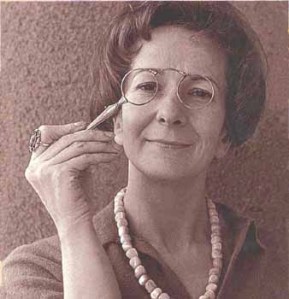One of my friends gave a fabulous presentation on Wislawa Szyborska in my AP Literature class so I thought I would share the haunting and moving poems with you after a brief biography of the poet.

Wislawa Syzmborska was born on July 2, 1923 in Bnin, Poland (now part of Kornick in Wester Poland), moving to Krakow, Poland at the age of eight. As a child, Szymborska was very interested in theatre, putting on productiosn with friends and later working as a prompter at an underground theatre during the Communist regime. Her first poetry was published in 1945, a time marked by Socialist Realism, and she completed her first collection three years later. Throughout her life, Szymborska published 16 poetry collections, received the Goeth Prize (1991) as well as the Herder Prize (1995). In 1996, she won the Nobel Prize in Literature, “for poetry that with ironic precision allows the historical and biological context to come to light in fragments of human reality.” Szymborska’s writing has always been marked by pessimist amd skepticism of the human race; however, she has always believed in the power of writing to allow the imagination to thrive and live outside the bound of politics and society.
Hunger Camp at Jaslo by Wislawa Szymborska
Write it. Write. In ordinary ink
on ordinary paper: they were given no food,
they all died of hunger. “All. How many?
It’s a big meadow. How much grass
for each one?” Write: I don’t know.History counts its skeletons in round numbers.
A thousand and one remains a thousand,
as though the one had never existed:
an imaginary embryo, an empty cradle,
an ABC never read,
air that laughs, cries, grows,
emptiness running down steps toward the garden,
nobody’s place in the line.
We stand in the meadow where it became flesh,
and the meadow is silent as a false witness.
Sunny. Green. Nearby, a forest
with wood for chewing and water under the bark-
every day a full ration of the viewuntil you go blind. Overhead, a bird-
the shadow of its life-giving wings
brushed their lips. Their jaws opened.
Teeth clacked against teeth.
At night, the sickle moon shone in the sky
and reaped wheat for their bread.
Hands came floating from blackened icons,
empty cups in their fingers.
On a spit of barbed wire,
a man was turning.They sang with their mouths full of earth.
“A lovely song of how war strikes straight
at the heart.” Write: how silent.
“Yes.”
This poem is so haunting to me in two distinctly different ways. In the first, two people discuss the deaths in the starvation camp. One man, probably a witness, challenges the other to write it all down on ordinary paper. The other is casually concerned with numbers and burial plots, but the other interjects. I found the most striking line to be the following: “History counts its skeletons in round numbers. A thousand and one remains a thousand, as though the one had never existed: an imaginary embryo, an empty cradle, an ABC never read…”
I think everyone can agree that we understand the difference between a single death and a group of deaths. The first is personal, shocking, and horrific, while the latter is a statistic. I think this imagery, however, speaks to the power of poetry. How can something so significant (an empty cradle, an ABC never read) be rounded out to a statistic? And how can it be written on “ordinary paper” with no intended reader? The second stanza has powerful imagery in and of itself, but the first stanza sent chills up my back. I thought I needed to share this with others.

Glad that you enjoy Wislawa Szymborska. I wrote an album of pop music based off her amazing works. You can check it out here:
http://itunes.apple.com/us/album/supercollider/id387574155
Hope you enjoy it!
Kevin